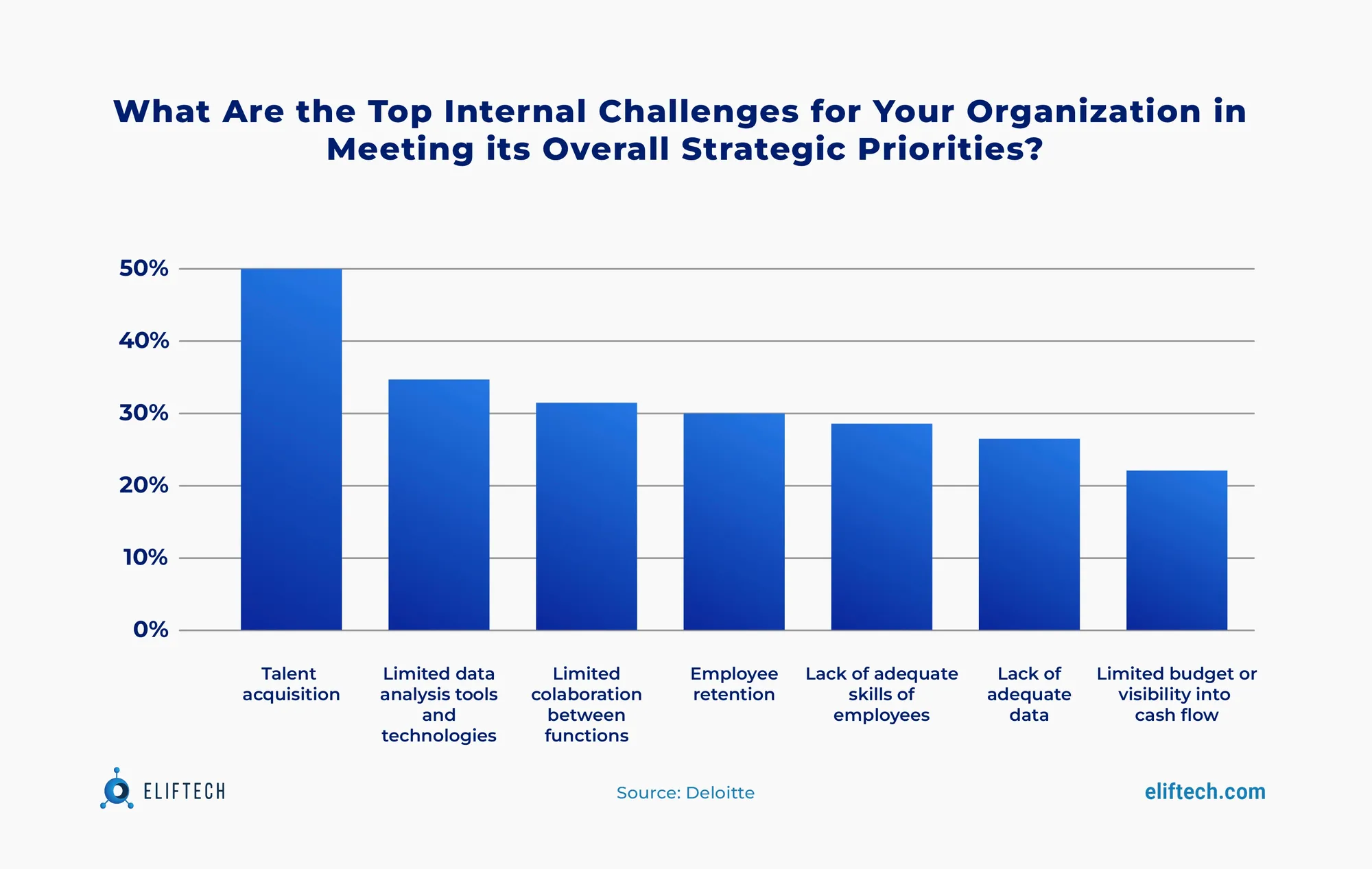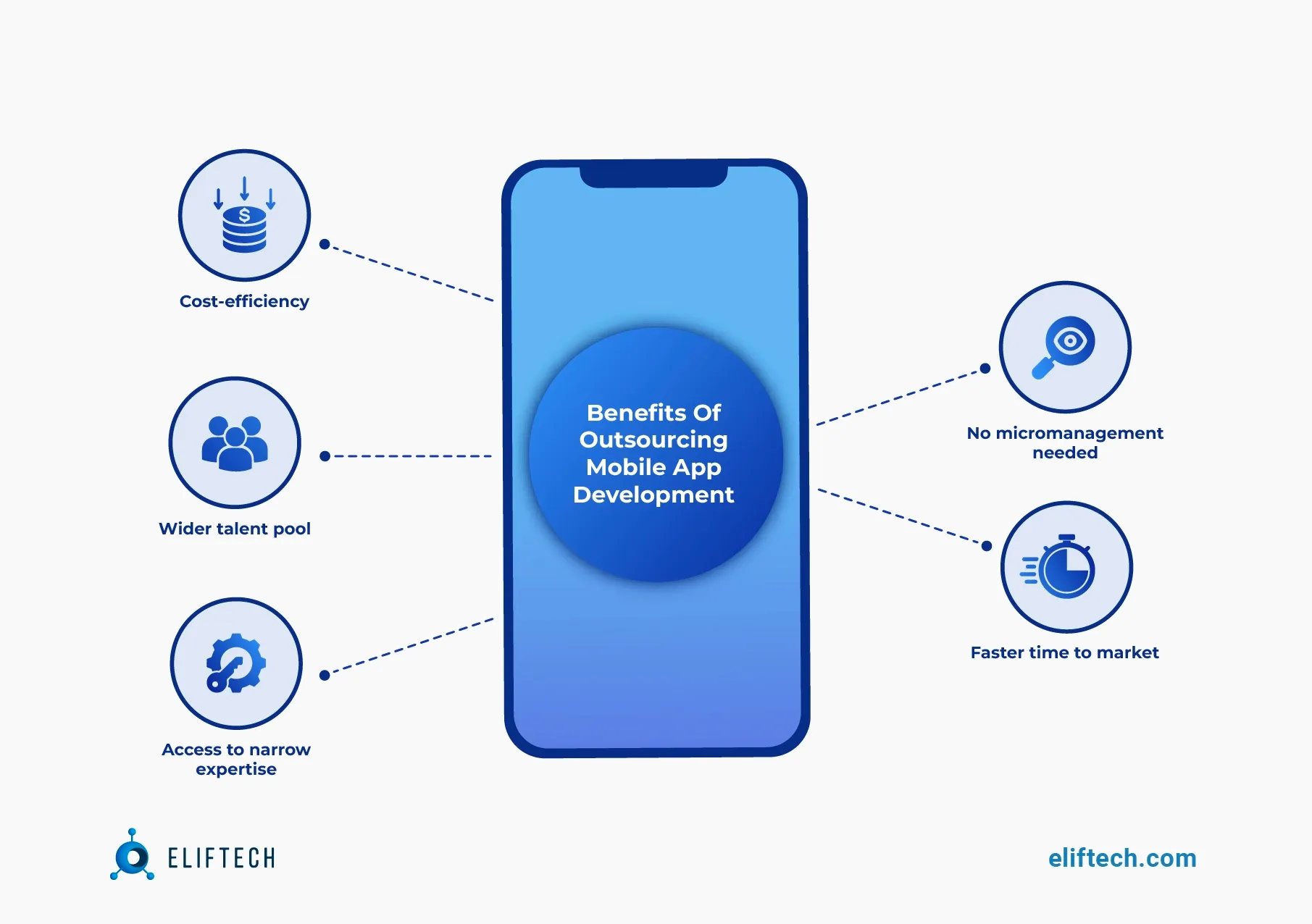Mobile App Development
How to Outsource Custom Mobile App Development

It's hard to picture a competitive digital business without a user-friendly mobile app that allows users to fulfill their needs through smartphones with just a few taps. According to a survey, 60% of global companies confirm that they develop mobile apps to boost their digital presence and provide more flexible customer journeys. Additionally, these companies seek quick, cost-effective development that maintains top-notch quality and functionality.
Recent research indicates that more companies will opt to outsource custom mobile app development until 2032. To put it in perspective, the IT and software service outsourcing market was valued at approximately USD 525 billion two years ago. Today, experts predict an annual growth rate of 8.2% from 2023 to 2032, with a projected value of around USD 1,149.24 billion by 2032.
This opens up a range of discussion points in this article, including the available hiring options, the benefits businesses can gain, and a step-by-step guide on how to do it right. So, what choices do you have, and how to outsource mobile app development correctly?
Benefits of Mobile App Development Outsourcing
Companies may encounter different scenarios in mobile app development that prompt them to outsource tasks to third-party vendors. As a result, this can open up a range of opportunities that extend beyond just app development jobs.
Wide Talent Pool
When you choose outsourcing, you are not limited to the local talent pool. This gives you the opportunity to work with specialized experts remotely and outsource IOS app development, Android app development, or cross-platform mobile app development from countries that are geographically distant from your company. This freedom lets you find the perfect team with an hourly rate and experience that best suits your capabilities.
What’s more, these teams come with all the necessary positions for development, so you don't need to search for additional talent like project managers. More importantly, your collaborations become more flexible. You can easily switch partners or rotate staff with an outsourced team when needed.

Outsource App Development Costs
The key advantage of this business practice is the opportunity for businesses to minimize costs.
By taking into account the average development job rates in the U.S, ranging between $50 to $200 per hour, and comparing them to the rates in Eastern Europe, ranging from $50 to $70 per hour, it becomes clear that when you outsource mobile app development, it can result in potential savings of up to 60%.
Additionally, consider the typical expenses associated with in-house employee recruitment, onboarding, monthly salaries, taxes, and other contract perks.
At the same time, a lower price doesn't necessarily mean worse quality. In fact, one of the widely recognized benefits of outsourcing to Eastern Europe is the combination of reasonable costs, highly skilled IT specialists, and proven expertise in diverse technologies.
Moreover, when outsourcing, there is no need to worry about purchasing equipment or service subscriptions for development, as outsourcing development agencies already have everything in place. And even if they don't, it won't be your concern.
Access to Diverse Expertise
Whether you need to fill a tech gap, solve a tech challenge, or team up with remote specialists - the mobile app development outsourcing team is the proven way to go. Such a team brings deep domain know-how in areas like AI, ML, IoT, blockchain, third-party integrations, and more across various industries, including FinTech, Healthcare, EdTech, logistics, etc., helping your business turn your innovative dreams into digital reality.
Such teams are on familiar terms with industry specifics and distinct requirements since they likely have a diverse portfolio of projects of any type, scale, and needs. As a result, they are experts in multiple frameworks and can help you choose the best technology for your project. Obviously, they have a broader view of industry trends, so they can provide insights from other fields, helping clients identify less obvious user pain points and make products more user-friendly.
Zero Micromanagement
If you find yourself constantly micromanaging your team and being involved in every little detail, it's a sign that you're running out of time for your own business responsibilities. To alleviate this burden, you can find an outsource mobile app development team and delegate the development tasks. This will allow you to dedicate more time to budget planning, business strategy, or addressing urgent matters.
Of course, it's important to ensure that the outsource mobile app development team you delegate the development tasks to is experienced and trustworthy. Otherwise, you could end up wasting time if the mobile app outsourcing developers fail to deliver on their responsibilities.
Faster Time to Market
In today's fast-paced business and technology landscape, the winner is the one who makes critical decisions faster. For instance, if your mobile development is delayed for some reason, your competitors can take advantage of this opportunity by launching their mobile solution faster.
Instead of investing time and resources in the lengthy process of hiring and managing an in-house team, you can opt to outsource mobile app development and meet your expected release deadlines. Outsourcing agencies have well-established development lifecycles and can efficiently handle all the tasks involved.
Additionally, don't overlook post-release essentials like updating the app for new OS versions and fixing bugs. Outsource mobile app development companies have qualified staff to manage these tasks and support your app, ensuring it stays on schedule.

3 Options for Creating a Mobile App
We want to highlight 3 typical options for mobile app development outsourcing projects. Each of these options has distinct advantages and disadvantages that you should weigh against your needs, requirements, and available resources.
Option 1. Purchasing ready-to-use apps
This option involves using existing, pre-built mobile applications that are readily available for deployment. You buy a pre-made app template and make minor design changes to match your brand. However, you usually can't change its functions.
They can be single or multi-tenant. Single-tenancy gives you an isolated database and more customization options, but it's not always available since it's costlier to maintain. Multi-tenant apps offer less customization and share a server, limiting your ability to modify your app's code.
Option 2. Hiring freelancers
You can hire a freelance software engineer for specific tasks, such as updating UI/UX design or integrating third-party tools into the platform, depending on the type of work required.
Freelance developers work independently, taking on project-based work and being paid either by the hour or for the entire project, and they are often remote. They can be budget-friendly for smaller projects, but they might not have the same depth of expertise as larger outsource mobile app development companies. Also, managing freelancers means you'll be responsible for hiring, onboarding, and overseeing their work, or you can hire a dedicated manager to handle these tasks.
You can find freelance developers on platforms like Upwork and Fiverr, with hourly rates varying from $15 to $150 per hour, depending on the developer's skills, location, and experience.
Option 3. Partnering with an outsourcing app development company
We may be biased, but we still believe hiring an independent tech partner is the best option for your request.
An outsourcing vendor supplies a comprehensive outsource mobile app development team that can match any of your requirements. You can partner with mobile app development outsourcing providers globally under favorable terms, reducing your hiring, management, and financial burdens.
Moreover, reliable outsourcing application development partners have well-established development procedures, industry know-how, and effective teams to ensure timely, high-quality, and budget-friendly delivery of digital solutions and products.
The main rule here is to search extensively for reputable mobile app development agencies that can provide an outsource mobile app development team of specialists capable of delivering quality work on time and within the budget allocated.
How to Outsource Mobile App Development in 7 Steps
When it comes to outsourcing, your budget must be an asset, not a liability, preventing overruns and risks. Here are 7 key steps to help you outsource custom mobile app development and find the perfect vendor.
Step 1. Define project requirements and scope for outsourcing
To start outsourcing a project, the first step is figuring out what your project needs, the tasks you want to outsource, and the issues you're looking to solve. These details will guide your search for the right vendor, helping you shape an effective outsourcing strategy and compile a list of vendors that match your needs and capabilities.
It is important to note you can engage a mobile app development outsourcing company at various stages of the development process, from design to coding and post-release support.
At ElifTech, we often start with a discovery call with our clients. In this call, we delve into their unique business context, understand the challenges they're facing, evaluate their staffing needs, and explore how outsource mobile app development services can help tackle those challenges.
Step 2. Set expectations, timelines, and deliverables
A successful mobile application outsourcing depends on how clear and understandable your expectations are at the start. To ensure a successful outsourced mobile app development project, follow these key guidelines:
- Define your app's goals and what it should achieve so everyone understands its intended impact.
- Describe what the app should include in detail (design, features, functions) to create a shared vision.
- Break the project into manageable steps or milestones to track progress.
- Set realistic deadlines and timeframes for each phase or task.
- Specify quality standards and performance benchmarks for a high-quality outcome.
- Assign clear roles and responsibilities to team members.
- Establish a structured communication plan to keep everyone on the same page.
- Prepare for potential changes and adjustments to adapt as needed during development.
Step 3. Research outsourcing partners by specific criteria
To create a list of potential outsourcing app development partners, you can conduct research in a variety of ways, from the classic referral request to Google searches and browsing online B2B platforms such as Clutch, LinkedIn, Facebook, etc.
We won't stop on the capabilities of these platforms, as you're likely familiar with them. Instead, we'll focus on the criteria you should consider when making your choice, as there's a lot at stake.
So, make sure to consider the following factors:
- Tech stack: Ensure your outsource mobile app development team is skilled in the technology you need, with a track record in the industry's latest tools.
- Response time: Ensure your outsourcing partner is responsive and available for smooth communication and timely results.
- Engagement options: Assess if they offer the right outsource mobile app development services for your needs, whether full-cycle development, remote developers, dedicated teams, or short-term projects.
- Management experience: Check how experienced their management team is to ensure reliability and productivity.
- Intellectual property: Review the contract for intellectual property protection and compliance with regulations.
- Budget transparency: Understand all costs, including hidden ones, to find a partner that fits your budget.
- Portfolio and past clients: Examine their previous work and past clients to gauge their expertise.
- Testimonials: Read real customer testimonials on B2B platforms to gauge their customer-centricity and reliability.
- Collaboration: Pay attention to cultural compatibility and communication abilities, as effective collaboration is key.
Step 4. Interview shortlisted partners and make the choice
When you've finally shortlisted 2-4 potential outsource mobile app development team, it's time for a comprehensive interview process.
You have various options to engage with your candidates:
- Email correspondence (formal but not very efficient).
- Instant messengers like Linkedin (informal and quick).
- Video conferencing via platforms like Skype and Google Meet (provides deeper insights than text).
After that, we recommend preparing a list of questions to ask about their project management, development approach, quality assurance, and other project-related aspects. To assess each candidate (programmer, designer) individually, here’s a simple checklist:
- Evaluate their years of experience and expertise.
- Examine the successful cases, showing their ability to finish projects.
- Determine their technical focus (front-end, back-end) to match your needs.
- Review their awards and certifications to gauge their competence.
- Ask about their ability to work under deadlines and prioritize tasks.
- Understand their involvement and alignment with your project's goals.
- Assess their project management and teamwork skills, which are crucial for project success.
Step 5. Finalize key contact terms and sign an NDA
When the moment comes to sign a contract, you'll need to pick the contract type for mobile application development outsourcing. In mobile app development outsourcing, the most common choices are Fixed Price (FP) and Time and Materials (T&M) contracts.
Under the FP contract, the client and the vendor agree on the project scope, timeframe, and budget before development starts. However, in mobile development, it's hard to pinpoint the exact time needed for a project. That's why many outsource mobile app development companies go for T&M contracts, where the client is charged based on the time and materials used to complete the project.
Also, the outsourcing model means you will need to share your company's confidential data with a potential vendor. To ensure the safety of your information, you should establish legal protections.
However, the choice of whether to sign an NDA is ultimately yours. Still, we recommend that you familiarize yourself with the types of documents listed for a professional partnership:
- Non-Disclosure Agreement (NDA): Protects your intellectual property, outlines data handling rules, and sets terms for contract termination.
- Service Level Agreement (SLA): Describes the outsource mobile app development services offered, scope of work, and terms for cancellation.
- Software Requirements Specification (SRS): Details the software specifications and development process.
Step 6. Build and test
Once the contract is signed, the intensive coding phase begins. As a client, your role is to supervise. We advise avoiding micromanagement, which can hinder progress and divert the team's focus.
Effective supervision means requesting regular reports from your partners weekly, monthly, or after hitting project milestones. You can also ask questions through email, chat, or calls as needed.
It's equally important to understand that coding includes bug fixing. So, don't worry if your partner spends around 30% of their time on quality assurance and resolving code issues. They also need to ensure the app works smoothly on different devices and user scenarios.
Step 7. Release your app
Finally, the moment you've been waiting for so much has arrived – it's time to release your app on Play Market or App Store. If you're unsure about the best platform or the right steps for publishing, your outsourcing partners will provide guidance.
Also, don’t depreciate the post-development support. In any case, you will need to analyze user feedback, make fixes, add new features, and release updates. So, there is no better solution than to continue working with the outsource mobile app development team that developed your app since they already know your app well.
Conclusion
Mobile apps are essential to modern life, and businesses that want to maintain a competitive advantage must have them and know how to outsource app development.
Moreover, as you can understand after reading all the above, this approach isn't exclusive to small businesses and startups; even major corporations such as Google, Slack, and Skype have embraced this strategy. So, if done correctly, outsourcing can result in a high-quality mobile app that meets your business objectives and user expectations. When considering the costs, it is often a highly cost-effective solution, offering a blend of high-grade expertise and a specialized skillset. Thus, if done correctly, outsourcing can result in a high-quality mobile app that meets your business objectives and user expectations.
If you’d like to outsource custom mobile app development services to a company with a strong, multi-skilled outsource mobile app development team and proven expertise in the field, reach out to our team and we'll find a solution for your business goals.
